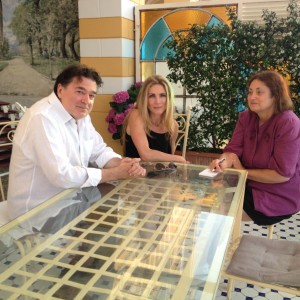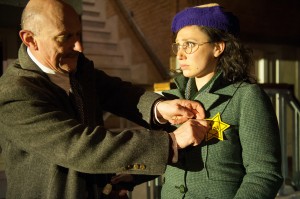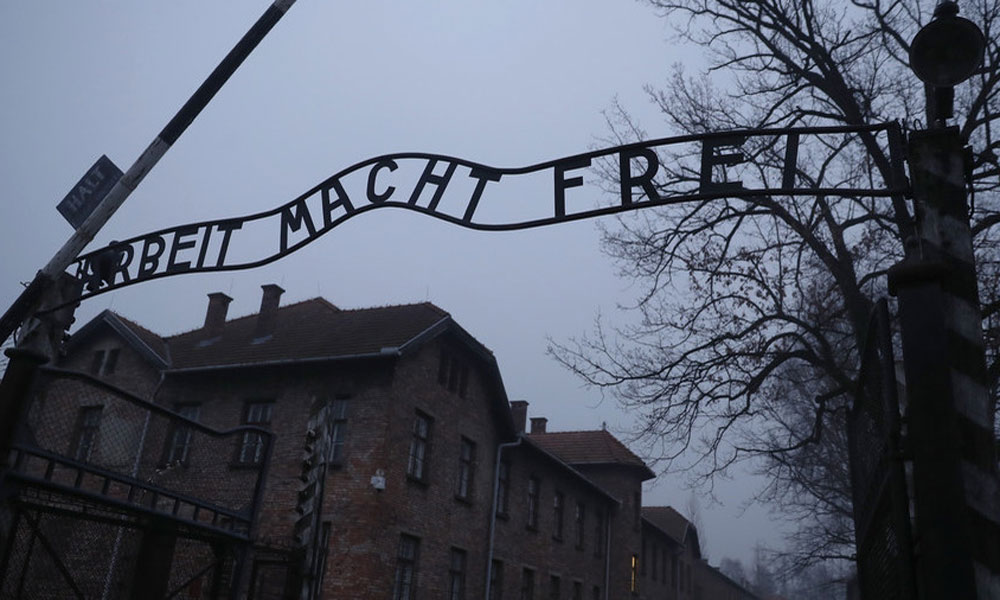Photo: At Theater Amsterdam, a new twist on an old story (courtesy Theater Amsterdam)
SORRENTO, ITALY–A new production at the Theater Amsterdam reimagines the world-famous story of Anne Frank and her diary. Entitled simply “Anne,” it is a contemporary, multimedia theatrical production brought to life by internationally renowned Dutch-Jewish husband and wife writing partners Leon de Winter and Jessica Durlacher. The play opened in early May with praise from The Times of London: “The story of the annexe, the soap opera of its inhabitants as perceived by a brilliant girl, was utterly unexpected to me … Anne’s insight, her psychological acuity, her capacity to find the words to express what is happening, all these are wonderful.”
The play’s authors, on vacation in a villa overlooking the Bay of Naples, sat down with Moment senior editor Dina Gold to talk about their latest work.
How did your involvement in this project start? 
The Anne Frank Fonds (Foundation) Basel, an educational charity established in 1963 by Anne’s father Otto, holds the universal rights of the Frank family estate. Their representatives approached us and asked us to work on this project. The copyright to the diary will expire in 2016 and the Foundation commissioned the play with the express intention of reaching new generations.
We were given access to the archives during the process of writing the script which helped us create a more realistic portrayal of the teenage Anne, whose original diary was edited to exclude some passages deemed unsuitable, such as her sexual awakening and rebellious personality, both by her own father and the English publishers.
The Foundation also chose the producer, Tony award winner Robin de Levita, whose previous repertoires on Broadway include Titanic, 42nd Street and Victor/Victoria with Julie Andrews and productions in London’s West End of Chicago, West Side Story and The Full Monty.
How is this rendition of Anne Frank’s story different than previous versions?
Our aim was to tell the story of Anne Frank in a totally fresh way to that of the previous stage versions–the 1955 play by Americans Frances Goodrich and Albert Hackett and its Broadway adaption, staged in 1997, which starred Natalie Portman. One should not forget that the original, immensely successful play by Goodrich and Hackett, based on the edited version of her diary, was what propelled the story to such worldwide fame. We should add that the original adaptation contained much that was also fictional. In addition, the Goodrich and Hackett version portrayed Anne in a somewhat fictional light, as a difficult American teenager–lively and forthright, but otherwise a rather flat personality.
We wanted more. At the front of our minds was a desire to reflect, as closely as possible, Anne’s own writing, which was extremely intelligent. We were very anxious not to shy away from the difficult relationship Anne described having with her mother, or from her wild desire for the only boy around in the annex. These issues were not overly articulated in the old play but in our opinion were vital ingredients for the story. We wanted to show Anne as the original, free spirit, we had found she really was. Our play is therefore much more about the personality of Anne herself, and everything that goes on in the annex as seen from her perspective.
We have taken her emotions, dreams and thoughts and removed them from the cramped confines of the tiny annex of the canal house she lived in with her family and four others. Even today, the annex is the dominant theme by which people relate to her story, but there was so much more to her. This means that Anne’s life before and after the diary features prominently for the first time. By adhering as closely as possible to the original source material we were able to widen the story far more than has been done to date.
We intercut life in the annex with real-life film footage and music of the period, extracts from the diary and narration by Anne herself of the increasing legal and social restrictions imposed on Jews by the Nazis.
A persistent thought, whenever one thinks of Anne Frank’s contribution to literature, is what might she have become had she lived. This poignant question was what we wanted to leave the audience reflecting on. But how to achieve this dramatically was one of the most difficult issues we had to tackle. Anne dreamt of one day studying in Paris and becoming a famous journalist and writer. In the play we were able to reflect that desire by opening the play in a Parisian restaurant where an adult Anne muses about publishing, to an editor she meets there. We do not end the play with the Gestapo raid on the Frank family’s hiding place, as is suggested in the old play by the terrible knocking on the door. We felt that the sound of someone knocking was insufficient in symbolizing the terrible events that followed the arrest of the two families. Our ending is very different, in that the audience sees Anne making one final, unfinished, speech in Bergen-Belsen about her dreams for her post-war life.
An innovative set design has been constructed thanks to a multimillion-dollar budget, aimed at “immersive theater” by introducing 180-degree screens. This has enabled producer Robin de Levita to use newsreel footage of Hitler’s anti-Semitic speeches. The scale of the set is so huge, with a 50- foot stage, that one section of the secret annex is constructed almost to identical real-life dimensions and Anne’s own handwriting can be projected onto the walls. The theater was specially built, in Amsterdam’s west port area, and has seating for 1,100.
foot stage, that one section of the secret annex is constructed almost to identical real-life dimensions and Anne’s own handwriting can be projected onto the walls. The theater was specially built, in Amsterdam’s west port area, and has seating for 1,100.
Starting on July 1, the production will offer audiences subtitles on electronic tablets or simultaneous translation via headphones in seven different languages including English.
How did the Nazi era impact on your families?
Jessica: My German-Jewish father Gerhard was sent to Westerbork and Terezin concentration camps and finally to Auschwitz along with his parents at the age of 13. His mother was sent from there to Stutthof, where she perished. My grandfather died in Bergen-Belsen the day after the Russians entered the camp. My father came out of Auschwitz at the age of 16. To illustrate some of the infinite cynicism that seems inseparable from historic facts about this past: When my father applied for compensation for the death of his father, the German authorities refused, arguing that his father died the day after liberation. The German compensation personnel decreed that the Nazis were not responsible for his death!
Leon: The lives of my parents’ families were typical of the majority of pre-war Dutch Jews: shleppers, simple merchants, umbrella repairmen, horse traders, and so on. They came from large families, poor, virtually illiterate in the Dutch language but nevertheless traditionally observant Jews. They all vanished, apart from my mother and her oldest sister, and my father and a nephew who was born while in hiding and who was given to foster parents, where he survived. (His parents were betrayed and killed.)
When I was young, my mother talked to me about these people every day and every day she would start crying and every day she ended her grief by eating. Up to her death she still expected her mother, my grandmother, to suddenly ring the bell and enter our house, a really nice house since my father had become a successful scrap-metal dealer in the 50s and had built himself a trophy house. The stories I grew up with were stories about hiding, fear, hunger, survival and grief. But also, my parents were impressively strong and found the strength to have children and create a future, despite everything. They only had a couple of years of elementary school education yet they loved Italian operas and adored Israel. The blue and white charity box of the Jewish National Fund had a prominent place in the centre of our house–the kitchen.
How have audiences reacted to this new way of telling Anne’s story?
King Willem-Alexander of the Netherlands came to the opening night. After a standing ovation, he came up to congratulate us both and we noticed that he had tears in his eyes and was making no attempt to hide his emotions. For us this was a very moving sign because it meant our work had had the impact we were seeking. It was not only the Dutch king who was deeply affected. The Times review ended, “Nearly 60 years later, in 2014, the Dutch audience stood to applaud. Me, I was sobbing. Anger, pity, couldn’t help it.”
What plans are there for the play to come to the United States?
For the moment there are no plans for Anne to travel outside of Holland, partly because the play is so expensive and technically complicated to produce. For that reason, although of course we hope that one day it will go on tour, we don’t think it will happen any time soon. So for the time being, anyone wanting to see Anne must go to Amsterdam.





A very interesting take and very appropriate questions by the interviewer, especially regarding the way the production was received because, after all, the importance is to maintain the memory of those events that best comes through via the personal life of an individual who lived – and died through it. It is a pity that the play can’t travel.